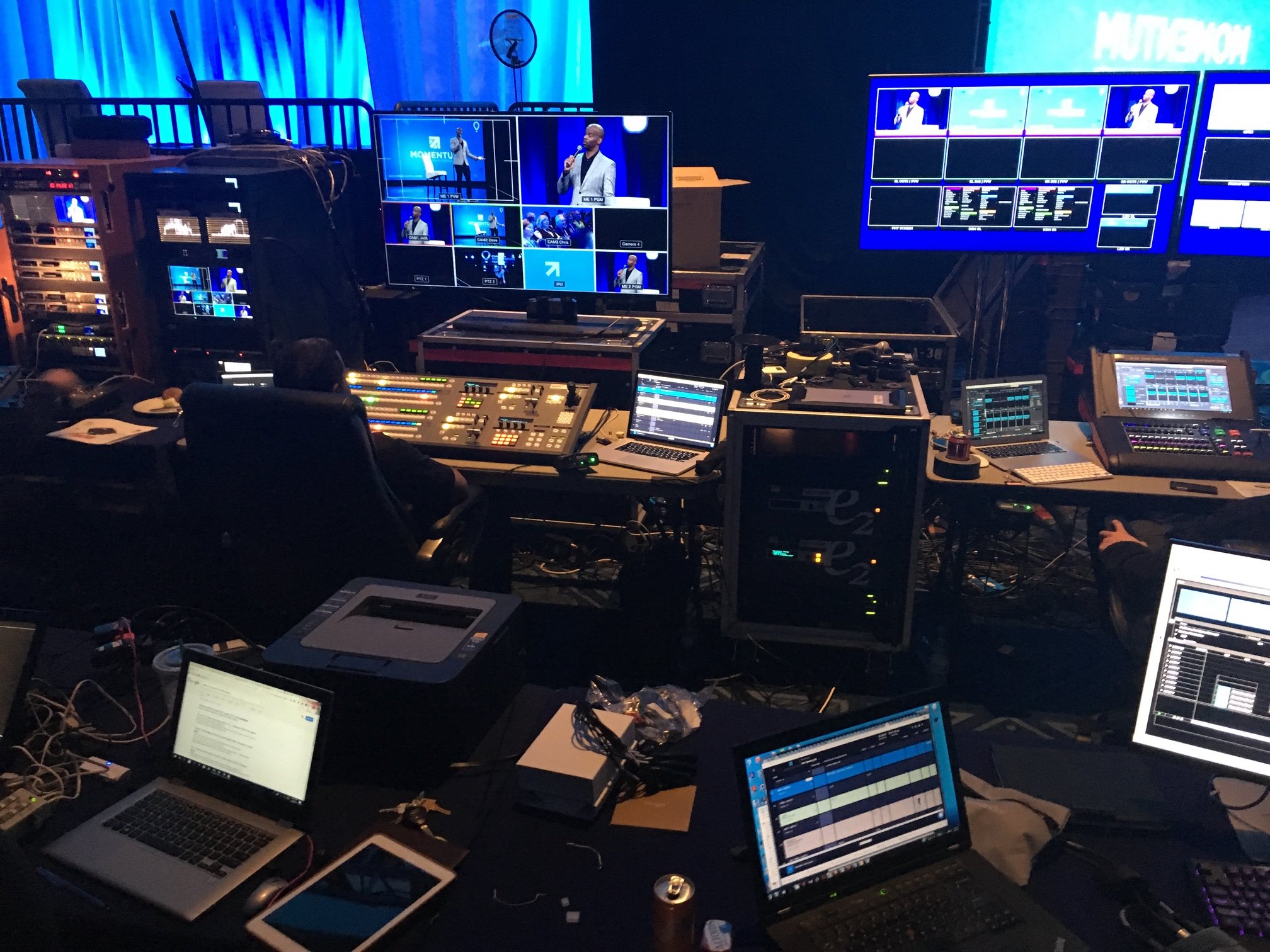How Event Production Functions: A Comprehensive Consider the Refine
Event production is a facility and organized procedure that needs cautious planning and implementation. It begins with establishing clear goals and understanding the target audience. Each step, from budgeting to place option, plays a crucial role in ensuring success. As the procedure unravels, different components should align effortlessly. The nuances of this intricate procedure commonly go unnoticed. What are the essential phases that add to an unforgettable event?

The First Preparation Phase
When beginning on event production, careful planning is necessary to assure an effective outcome. The initial drawing board acts as the foundation for all subsequent efforts. During this phase, event producers should define the event's purpose and objectives clearly. Identifying the target market aids customize the experience and messaging, ensuring importance and engagement.Producers have to additionally take into consideration the event layout, whether it be in-person, digital, or crossbreed, as this will influence numerous logistical components. Selecting an appropriate day and location is essential, as it influences accessibility and availability.Furthermore, assembling a reliable group is essential for dividing responsibilities and simplifying communication. Developing a timeline with turning points warranties all tasks are completed on routine. This stage entails thorough research, consisting of recognizing prospective difficulties and creating techniques to minimize dangers. Ultimately, a well-structured initial preparation stage sets the tone for an effective event production trip.

Budgeting and Resource Allotment
In event production, efficient budgeting and resource allowance are crucial for success - event production charlotte. Developing monetary specifications sets the foundation for all subsequent choices, while resource distribution methods assure that every element of the event is appropriately sustained. Together, these elements assist keep control over expenditures and maximize using offered resources
Establishing Financial Parameters
Developing monetary criteria is important to the success of any kind of event production, as it establishes the structure for reliable budgeting and source appropriation. This process begins with specifying the general budget plan, which includes all aspects of the event, consisting of venue prices, wedding catering, and advertising and marketing. By identifying offered funds, event organizers can focus on expenditures and allot resources appropriately. Furthermore, it is vital to conduct detailed marketing research to anticipate potential prices and determine financing sources, such as sponsorships or ticket sales. Establishing clear financial specifications additionally aids in threat administration, enabling coordinators to allot backup funds for unexpected costs. Eventually, a well-defined spending plan acts as a roadmap, leading the event production team towards attaining their goals while maintaining monetary control.
Resource Circulation Techniques
Effective resource circulation techniques are vital for taking full advantage of the impact of an event while sticking to budget restrictions. Effective event production calls for a thorough technique to budgeting and source allowance. Organizers have to prioritize essential elements such as venue, catering, and technology, guaranteeing that funds are designated to areas that improve attendee experience. A comprehensive spending plan ought to lay out expected expenses and recognize locations for potential expense financial savings, such as discussing with vendors or exploring sponsorship possibilities. Furthermore, tracking expenses throughout the planning process helps prevent overspending. By using tactical source circulation, event producers can supply a memorable experience while keeping monetary duty, eventually adding to the total success of the event.
Location Selection and Logistics
Picking the right place is vital to the success of any event, as it establishes the stage for the total experience. Location selection involves reviewing numerous factors, including ability, availability, and location. Coordinators have to take into consideration the target audience and the nature of the event, making certain the place aligns with the event's goals.Logistics play a significant role in this procedure, including plans for seats, audiovisual tools, and providing solutions. A well-chosen venue ought to promote smooth flow for attendees and personnel, enhancing engagement.Additionally, assessing prospective locations for amenities like vehicle parking, restrooms, and emergency situation exits is essential for security and comfort. The timeline for securing the venue is additionally critical, as preferred places may book promptly - event production charlotte. As a result, complete planning and prompt execution can inevitably contribute to a seamless event experience, making location option and logistics basic components of effective event production
Imaginative Concept Development
While the location sets the physical stage, creative concept growth forms the event's identity and narrative. This procedure begins with identifying the event's objective and target audience, permitting event manufacturers to formulate an engaging theme that resonates with guests. Conceptualizing sessions typically include diverse perspectives, cultivating innovative ideas that line up with the event's goals.Once a style is established, aesthetic elements such as color palettes, signs, and design are made to enhance the total ambience. Storytelling strategies may likewise be integrated to produce an engaging journey for participants, ensuring an unforgettable experience. In addition, considerations regarding home entertainment, tasks, and interactive components are straightened with the picked concept, reinforcing the theme throughout the event.Ultimately, effective innovative principle growth guarantees that every facet of the event works cohesively, leaving an enduring impact on attendees and meeting the event's purposes. This fundamental work prepares for succeeding preparation and execution phases.
Collaborating With Suppliers and Distributors
Successful event production depends upon effective cooperation with suppliers and distributors. Selecting reputable partners, working out contracts successfully, and making sure timely distributions are crucial steps in this procedure. Each of these factors adds considerably to the overall success and smooth execution of an occasion.
Choosing Reliable Allies
How can event planners guarantee a smooth production experience? Selecting trusted companions is necessary in achieving this objective. Event organizers should carry out extensive research to identify suppliers and distributors with a proven track document of excellence. This consists of inspecting references, evaluating profiles, and assessing customer comments. Organizers need to focus on companions that show professionalism visit this page and trust, timely interaction, and a determination to team up. Structure solid relationships promotes depend on and enables quick problem-solving throughout the event. Furthermore, it is valuable to select local vendors who comprehend the location and regional logistics. Ultimately, an effective event rests on the harmony between planners and their partners, making certain that every facet of production runs efficiently and effectively.
Discussing Contracts Effectively
Reliable arrangement of contracts is a vital action in the cooperation in between event coordinators and their vendors and providers. This process involves clear communication of expectations, deliverables, and timelines. Organizers must conduct extensive research on market prices and industry criteria to develop a standard for settlements. image source It is essential to create a joint ambience, encouraging open dialogue regarding terms, pricing, and possible contingencies. Organizers ought to additionally prioritize comprehending the vendor's abilities and limitations to straighten their needs properly. Flexibility can bring about mutually valuable agreements, promoting long-term connections. Crafting distinct contracts that include certain efficiency metrics can help ensure liability, ultimately causing successful event execution and contentment for all parties involved.
Making Certain Prompt Deliveries
Prompt shipments are essential for the smooth execution of any kind of event, calling for persistent partnership in between organizers and their vendors and providers. Efficient interaction is vital, as it assists develop clear assumptions pertaining to delivery schedules, quantities, and certain demands. Organizers frequently produce in-depth timelines to lay out critical milestones, guaranteeing all celebrations stay lined up throughout the process. Routine check-ins with vendors can assist determine prospective hold-ups early, enabling for positive options. In addition, constructing solid connections with trustworthy distributors cultivates trust fund and liability, which can lead to much better service and prioritization. By prioritizing these collaborative efforts, organizers can lessen interruptions, thereby improving the general effectiveness of event production and making sure that all necessary products and solutions get here as planned.
Marketing and Promo Approaches
While organizing an event, the success of marketing and promo methods can significantly affect participation and engagement. Reliable techniques often consist of a mix of digital advertising and marketing, conventional advertising and marketing, and grassroots outreach. Using social media sites platforms permits real-time interaction and targeted advertising and marketing, reaching specific demographics properly. Email advertising projects can even more involve potential guests with tailored content and reminders.Collaborations with influencers or sector leaders can also improve credibility and broaden reach. Creating engaging web content, such as videos or blogs, assists to create buzz and sustain rate of interest leading up to the event. In addition, leveraging early-bird discounts and special rewards can incentivize ticket purchases.Promoting through standard networks, such as have a peek at these guys posters or neighborhood media, remains appropriate, specifically in community-focused events. An extensive strategy that incorporates multiple techniques assurances optimum presence and involvement, ultimately contributing to the event's success and the development of an unforgettable experience for participants.
On-Site Implementation and Monitoring
On-site implementation and management are important elements that figure out the general success of an occasion. Reliable control throughout the event assures that all components straighten with the intended schedule. Event supervisors look after logistics, consisting of supplier sychronisation, devices configuration, and guest services. Keeping an eye on timelines and attending to any kind of unforeseen problems are essential for maintaining a seamless experience.The staff plays a significant role, as qualified personnel are in charge of various jobs such as enrollment, info dissemination, and technological support. Communication amongst group members is necessary; it promotes a collective environment and makes it possible for fast resolution of challenges.Additionally, security protocols must be stuck to, guarding the wellness of all attendees. Post-event analyses are likewise part of on-site monitoring, supplying insights for future renovations. By concentrating on these aspects, event manufacturers can produce memorable experiences that fulfill or surpass participant assumptions while achieving the event's purposes.
Frequently Asked Inquiries
How Do I Choose the Right Event Motif?
Selecting the ideal event style involves thinking about the target audience, event purpose, and location. Investigating present fads and gathering input from stakeholders can additionally influence creative concepts that resonate and produce a memorable experience.

What Prevail Errors in Event Production?
Common mistakes in event production usually consist of insufficient planning, poor interaction amongst group members, budget mismanagement, neglecting to take into consideration the audience's needs, and failing to perform a thorough post-event evaluation for future renovations.
Exactly How Can I Measure Event Success?
To gauge event success, one can assess guest complete satisfaction, engagement degrees, spending plan adherence, and post-event comments. Key efficiency indicators, such as ticket sales and social media communications, also offer valuable understandings into total efficiency.
What Should I Do if It Moistens the Event Day?
In case of rain on the day, the coordinator ought to implement backup plans, such as safeguarding camping tents or relocating activities inside. Communication with participants regarding adjustments is necessary to guarantee a smooth experience regardless of weather difficulties.
How Can I Make Sure Attendee Interaction During the Event?
